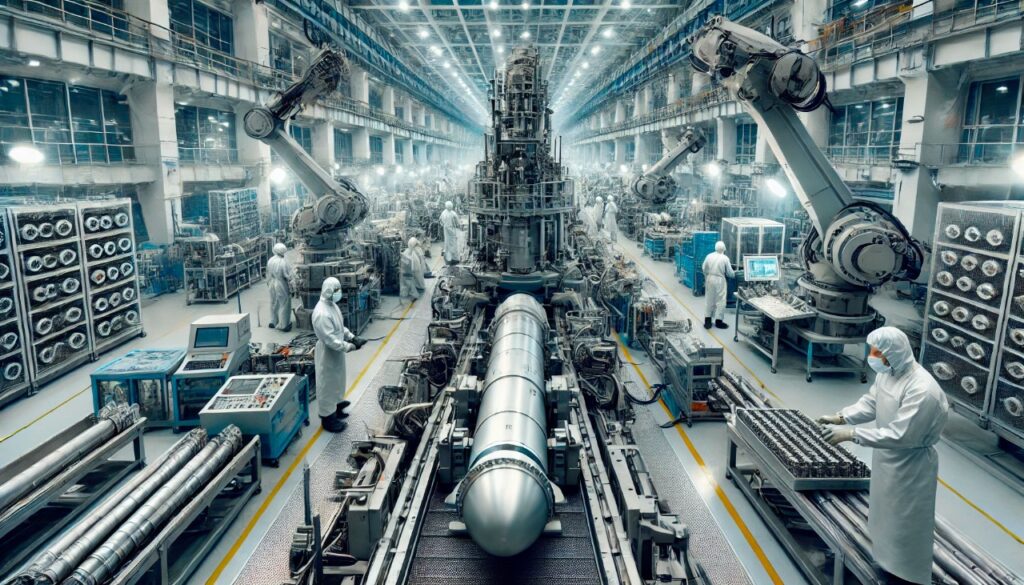
Why Buy a Panamanian Company vs. Other Jurisdictions
04/11/2024
How to Unlock an Account in a Financial Institution
10/12/2024
Investing in a Defense Technology Portfolio does not mean supporting warfare. This index was created by experts at OPM Corporation
A defense technology portfolio is an investment tool that provides diversified exposure to the defense and security sector, encompassing companies that develop advanced technologies in areas such as defense systems, intelligence, cybersecurity, and surveillance. The index is not solely focused on weapons production but represents a broad ecosystem that includes dual-use technologies applicable to civilian security, cybersecurity, and rescue missions.
Investing in a defense technology portfolio helps investors diversify and reduce the risk of relying on the performance of a single company. In this sector, performance can be affected by changes in government policies, regulations, and geopolitical events, so diversification through the index spreads risk across a portfolio of companies with expertise in various areas of defense and security.
Another reason to consider this portfolio is that it offers stability and profitability during times of crisis. Companies in the defense sector tend to be resilient during periods of economic recession or uncertainty due to long-term government contracts and sustained demand for national security. This stability is strengthened because defense spending generally holds steady or even increases during challenging times, reducing the impact of economic volatility and providing counter-cyclical returns.
Additionally, a defense technology portfolio offers exposure to advanced and dual-use technologies, as many innovations developed by these companies extend beyond military use. Advances in areas such as cybersecurity, surveillance, and rescue have applications in civilian contexts, such as disaster management and public security infrastructure.
Conservative Investment Strategy with a Defense Technology Portfolio
Investing in defense and arms companies can be a profitable financial strategy without necessarily implying support for armed conflicts. These companies play a crucial role in national security and stability, responding to the demands of governments aiming to protect their territories and citizens from potential threats. This demand is increasing due to rising geopolitical tensions, the threat of terrorism, and the need for enhanced cybersecurity.
Additionally, many companies in this sector drive cutting-edge technological advancements, such as surveillance systems, artificial intelligence, and drones, which can also have civilian applications, including emergency response, rescue missions, and public safety. These innovative technologies often bring benefits to society as a whole and have a positive economic impact, generating highly specialized jobs and contributing to industrial growth and technological development. This translates into economic stability for these companies, as long-term government contracts provide consistent revenues and strong resilience during financial crises that may affect other sectors.
Investment in the defense sector is also highly regulated. Many of these companies comply with strict ethical and transparency standards, with clear restrictions on selling products to countries in active conflict or with records of human rights abuses. Furthermore, these regulations allow companies to prioritize defensive systems over offensive ones, focusing on security and protection. Thus, rather than promoting war, defense investments can have a positive impact by fostering stability and helping to maintain geopolitical balance.
Companies in this sector also support humanitarian missions and peace programs, allowing investors to view this type of investment from the perspective of global security and technological development for society’s benefit. This blend of stability, innovation, and regulation makes the sector a profitable and responsible option for investors.
Legal Disclaimer: Risks in Stock Market Investments
Investments in the stock market carry significant risks and may not be suitable for all investors. The value of financial assets, including stocks, bonds, and other market instruments, can fluctuate considerably due to various factors such as economic changes, government policy decisions, market conditions, and unforeseen events. These fluctuations may result in losses on the invested capital and, in extreme cases, even the total loss of the initial investment.
It is important to remember that the past performance of any asset does not guarantee future results. Diversification and rigorous analysis are recommended to mitigate some risks but do not eliminate the possibility of losses. Additionally, investing in foreign stock markets carries further risks associated with currency exchange rates and the economic conditions of the home country.
We recommend all investors conduct thorough research or consult a certified financial advisor before making investment decisions. This document does not constitute financial advice or a recommendation to buy or sell any particular financial asset.

OPM Corporation Defense Technology Portfolio
- Advanced Micro Devices (AMD)
- BAE Systems
- CrowdStrike
- Dassault Aviation
- Elbit Systems
- ETF Global X Uranium
- GE Aerospace
- Lockheed Martin
- Palantir Technologies
- SoFi Technologies
Advanced Micro Devices (AMD) 10%
Advanced Micro Devices (AMD) has emerged as a formidable competitor in the technology and artificial intelligence (AI) sector, driven by its high-performance processors and graphics processing units (GPUs). The company has made significant strides in data centers, gaming, and AI applications, challenging Nvidia’s dominance in these fields.
AMD has strengthened its presence in the data center market with its EPYC processors, which deliver competitive performance and energy efficiency. In the third quarter of 2024, the company reported record revenues in this segment, reaching $3.5 billion, marking a 122% year-over-year increase and a 25% sequential increase.
In the gaming sector, AMD has experienced a decline in revenue due to reduced demand for console components and Radeon graphics cards. However, the company plans to revitalize this market with the launch of its RDNA 4 GPUs in 2025.
The $35 billion acquisition of Xilinx has bolstered AMD’s portfolio in adaptive computing and FPGAs, positioning it in sectors such as AI, telecommunications, and automotive. This integration allows AMD to offer more versatile solutions, expanding its reach in AI applications and other emerging markets.
While Nvidia retains a dominant position in the AI market with its CUDA architecture and widely adopted GPUs, AMD has made rapid progress. The company has invested in developing AI accelerators, such as the AMD Instinct MI325X, and has established strategic alliances to strengthen its position in this sector.
With a diversified strategy and a focus on innovation, AMD is well-positioned to challenge Nvidia’s dominance in the long term. The combination of its EPYC processors, RDNA GPUs, and the integration of Xilinx technologies enables AMD to offer competitive solutions in the AI market and beyond.
In summary, AMD represents a compelling investment in the technology and AI sectors, backed by its commitment to innovation and its ability to adapt to shifting market demands.
BAE Systems(LSE: BA) 10%
BAE Systems, based in the United Kingdom, is one of Europe’s leading defense companies. The company manufactures a wide range of military equipment, including combat aircraft, armored vehicles, naval systems, and cyber technologies. It holds significant contracts with various European countries, particularly within the framework of joint defense programs.
In recent years, BAE Systems has achieved notable growth. In the first half of 2024, the company reported a 13% increase in revenues, reaching £13.4 billion, along with operating profits rising to £1.39 billion. The order book grew by 6% to £74 billion, driven by orders from Australia and Eastern Europe, as well as the acquisition of a space company in the United States.
BAE Systems has secured notable contracts across Europe. In July 2024, the company awarded a £42 million contract to the Czech company Tatra Defense Vehicle to manufacture armored vehicles under the Collaborative All-Terrain Vehicle (CATV-3N) program for Germany, the United Kingdom, and Sweden.
Additionally in October 2024, BAE Systems entered a strategic partnership with the Spanish company Amper to strengthen technological capabilities in the defense sector, including potential technology transfer.
With rising defense spending in Europe and involvement in joint programs, BAE Systems is well-positioned to continue its growth and enhance its presence in the European defense market.
Crowdstrike (CRWD) 10%
CrowdStrike is a strategic investment in the cybersecurity sector due to its leadership in cloud-based protection solutions and its real-time threat response capabilities. Its AI-powered Falcon platform offers advanced endpoint detection and response (EDR) capabilities, addressing a critical niche in an environment where cyberattacks are increasingly frequent. With a recurring revenue model that ensures steady growth and high customer retention rates, CrowdStrike is well-positioned to capture a larger share of the cybersecurity market, making it an attractive long-term investment for achieving superior returns.
CrowdStrike is essential in the defense sector due to its ability to protect critical military and government infrastructure against advanced cyberattacks. Its AI-driven Falcon platform detects and neutralizes threats in real time, serving as a key line of defense in cybersecurity operations for military agencies facing persistent and sophisticated attacks. With expanding contracts with the U.S. Department of Defense and allied agencies, CrowdStrike has established itself as a leader in protecting highly sensitive assets. Its recurring revenue model drives growth and ensures financial stability in a sector with ever-expanding budgetary priorities.

Dassault Aviation SA 10%
Dassault Aviation SA is a French company recognized for its expertise in high-tech combat aircraft, such as the Rafale fighter jet, used by air forces in Europe and other global markets. With a strong track record of government contracts and exports, Dassault capitalizes on the growing demand for advanced defense capabilities in an ever-evolving global security landscape. Additionally, its participation in European joint defense programs, such as the Future Combat Air System (FCAS), secures its position as a key player in military aviation, providing financial stability and long-term growth potential in the defense sector.
In the first half of 2024, Dassault Aviation reported adjusted revenues of €2.538 billion, a 10.6% increase compared to €2.295 billion during the same period in 2023. This increase is attributed to the delivery of six Rafale jets to France and twelve Falcon jets. Adjusted operating income rose to €170 million, compared to €151 million in the first half of 2023. Adjusted net income was €442 million, up from €405 million in the same period the previous year.
The consolidated backlog as of June 30, 2024, was €41.157 billion, compared to €38.508 billion as of December 31, 2023. This backlog includes 223 Rafale jets (159 designated for export) and 83 Falcon jets.
Dassault Aviation has secured notable defense contracts. In January 2024, the French Defense Procurement Agency (DGA) awarded Dassault a contract for the production of 42 Rafale F4 standard aircraft for the French Air and Space Force.
In August 2024, Serbia signed an agreement with Dassault Aviation to acquire Rafale fighter jets, marking a significant milestone in the company’s expansion within the European market.
With increased defense spending and demand for advanced technologies, Dassault Aviation is well-positioned to sustain its growth and enhance its presence in the defense market. The company continues to invest in research and development to offer innovative solutions that meet customer needs and contribute to global security.
Elbit Systems (ESLT) 10%
Elbit Systems Ltd. (NASDAQ: ESLT), an Israeli leader in defense technology, offers an attractive investment proposition due to its strong position in advanced technologies and its diversification across multiple military and security product lines. The company is known for its surveillance systems and drones, particularly the Hermes line, widely used in global reconnaissance operations, including complex geopolitical scenarios. With significant contracts in Israel and with various NATO countries, Elbit benefits from steady demand in an increasingly volatile global security environment. Additionally, its ability to innovate in autonomous systems and cybersecurity provides a resilient revenue stream, favorably positioning it in a defensive sector that tends to be countercyclical—valuable for portfolio stability in uncertain markets.
In the second quarter of 2024, Elbit Systems reported revenues of $1.626 billion, marking an 11.85% increase compared to the same period in the previous year. Adjusted diluted earnings per share were $2.08, up from $1.65 in Q2 2023. The order backlog reached $20.4 billion, with approximately 71% designated for export to international clients.
Elbit Systems has secured notable contracts in the defense sector. In October 2024, the company won a $200 million contract to supply a laser defense system, as part of a broader $533 million agreement aimed at expanding laser interception systems substantially.
In May 2024, Elbit Systems signed a $305 million contract to provide PULS artillery rocket systems to the Dutch Army, as part of an agreement between the defense ministries of Israel and the Netherlands.
With increased defense spending and demand for advanced technologies, Elbit Systems is well-positioned to sustain its growth and enhance its presence in the defense market. The company continues to invest in its research and development to deliver innovative solutions that meet customer needs and contribute to global security.
ETF Global X Uranium (URA) 10%
Managed by Global X, this fund has over $2.9 billion in assets under management, pays an annual dividend of nearly 6%, and is considered a disruptive investment. In the short term, it could benefit from the current geopolitical tensions in the Middle East, but its long-term appeal lies in the global shift towards reducing carbon emissions. As more countries pursue sustainable energy solutions, nuclear power is increasingly viewed as a viable option, with uranium playing a critical role in sustainable energy. Global uranium production has declined in recent years due to historically low prices; however, demand is surging, largely driven by the high energy consumption associated with the artificial intelligence boom. This limited supply could lead to rising prices.
The ETF currently trades around $30, whereas in early 2011, it was valued above $130.
With AI driving exponential energy demand in data centers and high-capacity processing, nuclear energy is positioned as a reliable and clean energy source to meet this need.
GE Aerospace (GE) 10%
GE Aerospace, a division of General Electric, is a leader in the defense sector, known for its advanced engines and propulsion systems for military and commercial aircraft. The company is a primary supplier of engines for combat jets like the F-35 Lightning II and military helicopter programs, providing recurring revenue and financial stability through long-term government contracts. Additionally, GE Aerospace is investing in next-generation technologies, including more efficient and sustainable propulsion systems, positioning it well in a growing market driven by fleet renewal and demand for high-tech defense solutions.
In the third quarter of 2024, GE Aerospace reported adjusted revenues of $8.943 billion, reflecting a 6% increase over the same period in the previous year. Adjusted earnings per share increased 25% to $1.15. These results were driven by a 28% increase in total orders, amounting to $12.6 billion, and a 10% rise in commercial service revenues.
GE Aerospace has secured notable contracts in the defense sector. In July 2024, in collaboration with the NATO Support and Procurement Agency (NSPA), the company completed an initial study on next-generation rotorcraft capacity. This study analyzed advanced powerplant solutions to support NATO missions.
Additionally, in March 2024, the company announced an investment of over $650 million in manufacturing and supply chain facilities to expand LEAP engine output and prepare for GE9X production, supporting both commercial and military clients.
With rising defense spending and demand for more efficient, sustainable propulsion technologies, GE Aerospace is well-positioned to continue growing and strengthen its presence in the defense market. The company continues to invest in research and development to deliver innovative solutions that meet client needs and contribute to global security.

Lockeed Martin (LMT) 10%
Lockheed Martin is one of the strongest investments in the defense sector, with a diversified portfolio that includes advanced aircraft, missile systems, space technologies, and cybersecurity solutions. Its leadership in programs like the F-35 stealth fighter jet and the THAAD missile defense system ensures long-term contracts with key governments, including the United States and various allied nations, providing predictable revenue streams. Lockheed is also expanding its presence in the rapidly growing space sector through launch projects, satellites, and collaborations in lunar and Mars exploration, expanding growth prospects.
With a solid track record of returns and increasing dividends, as well as low correlation with economic cycles, Lockheed Martin represents a defensive and strategic asset in a diversified portfolio. It is ideal for capturing value in an environment of high demand for security and advanced technology.
Palantir Technologies (PLTR) 10%
Palantir stands out in the defense sector for its high-precision data analytics software in military applications and its integration capabilities in military and intelligence operations. Its Gotham and Foundry platforms are essential for processing and analyzing large volumes of data in real-time, which is critical for decision-making in combat and strategy. With strong contracts with the U.S. Department of Defense and various allied agencies, Palantir benefits from growing demand for AI-based defense technologies. This military focus and its expertise in intelligence and security position it strategically in a high-priority government sector, ensuring recurring revenues and sustainable growth potential in a high-demand technological environment.
Palantir (PLTR) is also an attractive opportunity in the tech sector, particularly in Artificial Intelligence (AI). Through its Foundry and Gotham platforms, Palantir has built a robust AI infrastructure that enables clients not only to analyze data but also to predict and respond to high-impact events with agility. With long-term contracts with government agencies and Fortune 500 companies, Palantir is well-positioned to capture a larger share of the AI market. It benefits from high entry barriers and increasing demand for advanced data and intelligence solutions, strengthening its recurring revenue and growth potential in a highly competitive tech landscape.
Sofi Technologies (SOFI) 10%
SoFi Technologies Inc. (NASDAQ: SOFI) is a prominent company in the fintech sector, offering a comprehensive platform with banking, lending, investment, and insurance products that attract a young, digitally connected user base. With a full banking license, SoFi can generate interest income on deposits and offer competitive rates, improving its margins compared to fintechs without a banking license. Its focus on technology and personalized user experience helps expand customer loyalty and retain users across multiple products, driving its growth. This “financial superapp” model gives SoFi significant potential in a rapidly growing fintech market with high demand for integrated financial services.
In the third quarter of 2024, SoFi reported net revenue of $697 million, a 30% increase compared to the same period in the previous year. The company posted a net profit of $61 million, marking its fourth consecutive quarter of profitability under generally accepted accounting principles (GAAP). Total membership increased by 756,000, reaching nearly 9.4 million, reflecting significant expansion in its user base.
SoFi also raised its financial forecast for fiscal year 2024, now expecting adjusted net revenue between $2.535 billion and $2.55 billion, with earnings per share between $0.11 and $0.12.
As of November 1, 2024, SoFi’s stock is trading at around $11.04. Over the past month, the stock has appreciated by more than 40%, reflecting market confidence in the company’s financial performance and growth prospects. However, the stock remains below its all-time high of $28, suggesting additional appreciation potential if the company continues its growth trajectory.
With its “financial superapp” model and a diversified product offering, SoFi is well-positioned to capitalize on the growth of the fintech market and the demand for integrated financial services. Its ability to attract and retain a young, digitally connected user base, along with its full banking license, provides it with a competitive advantage in the sector. The company continues to invest in technology and user experience to enhance customer loyalty and expand its market share.




